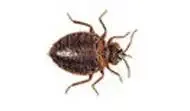Address
A & H Pest Control
The Berries
Yester Rd
BR7 5LT
020 8295 3402
Address
A & H Pest Control
The Berries
Yester Rd
BR7 5LT
020 8295 3402

[h2]Bed Bug[/h2]
(Cimex lectularius)
4 – 6 mm
[h6]Biology[/h6]
Female bed bugs lay 1-5 eggs per day with the white eggs being deposited individually in cracks or on rough surfaces and secured with a transparent cement for an average total of 200 eggs; maximum eggs per day is 12, with 541 for a lifetime. About 3-10 minutes are required for each blood meal. Development time egg to adult takes 21 days at 30°C to 120 days at 18°C. with normal feeding & reproductive cycles individuals can live up to 316 days. Humans are the preferred hosts of bed bugs but in their absence bed bugs will feed on poultry, canaries, sparrows rats, mice etc. Bed bugs have been found to be infected with some 25 different disease organisms.
Life Cycle: Incomplete Metamorphosis.Egg, Nymph, Adult
[h6]Habits[/h6]
Bed bugs harbour in cracks and crevices during the day and come out to feed at night. Typically they can be found around mattress buttons and beading, in bed springs or coverings, and in any crevice of a wooden bed frame. Other places to look are picture frames, stuffed furniture, floorboard cracks, behind lose wall paper and door and window frames etc. adults can survive for up to 6-7 months if they are well fed and they can feed in other animals if humans are not present.
[h6]Reasons for Control[/h6]
Bad publicity, loss of goodwill, prevention of disease, loss of quality, bad relations, annoyance factor.
[h6]Solution How to get rid of Bed Bugs[/h6]
The best solution to the question “How to get rid of bed bugs?” is to call the experts, as we are experienced with the best and tried methods to get rid of your unwanted pests.
[button url=”https://www.aandhpestcontrol.co.uk/contact” target=”_self” size=”medium” style=”limegreen” ]Contact A and H Pest Control[/button]